- Home
- Tony Roberts
Dark Blade Page 10
Dark Blade Read online
Page 10
The courtyard seemed to take up about a quarter of the length of the temple area. On the far side an impressive faced building rose, of two floors, with towers and turrets poking up higher still at irregular intervals. Off to the far left there were a number of small shrines with gardens bordering each, and the buildings immediately behind them and above were too close to be seen properly.
The courtyard was mostly paved but small areas of grass were also to be seen, each with a statue of some deity in the centre.
“Funny place,” Markus commented. “Do they just pray to the gods all day long here?”
“I don’t know. I’m not concerned with the gods – they’ve done nothing for me.”
Markus grunted. “I can see Nusepak, the god of the sea, with his fish’s tail over there.”
Faer sneered. She despised the sea, fishermen and anything to do with it. All because of her treatment by the sea people of Selanic. “As I said, I worship no god. They mean nothing to me.”
“Everyone should have at least one god; how else are you going to get help in times of difficulty? The gods would help you more if you prayed to one.”
Faer folded her arms and sat back. “I’d rather rely on myself than some unseen being who demands my gratitude for nothing.”
Markus set his lips tightly. He knew better than to try to argue with the girl. A few moments later a long-robed figure appeared from one side and stopped in front of them. He was dressed in dark blue with lighter blue edging, and he had white hair and a ruddy complexion. “Ah, the two young visitors. You wanted help, I understand?” As the two began to stand, he waved them both back down, and sat on the same side as Faer, although a comfortable distance from her.
“Please,” Faer said. “We’re trying to get to Blade Mountain, but we understand the rebel army is now blocking the way by river?”
“Blade Mountain?” the man looked at Faer’s sword hilt. “Ah, I see. You wish to become a student there? Shame, such a beautiful creature would benefit all by becoming a priestess. No matter, I can sense you have a drive within you, even after just meeting you. We here believe in the tranquillity of life and worship whatever deity we wish without conflict. That may well go on outside these walls, but in here, peace reigns. May I receive an assurance from you that your blade will not be bared within these walls?”
Faer bowed her head.
“Hmm, thank you. Very well, I cannot see any problem in you staying here one night. We do have a number of pilgrim rooms, very basic of course, for pilgrims are not concerned with comfort or luxury, just spiritual nourishment.” He waved out into the courtyard where people were making an obeisance to one of the statues. “Of course, you will have separate rooms; one cannot have you sharing one. Beauty is to be admired and enjoyed visibly; not physically. At least here, anyway.”
Markus looked abashed and couldn’t meet Faer’s thoughtful look.
The priest nodded as if vindicated. “So, would you please honour me by telling me your names and where you have come from?”
The two did so. The priest bowed, then introduced himself as Cleric Ghular. “I am a humble servant of the almighty Horthas, god of the sky. Please follow me to your rooms, then I shall tell you a few house rules. Outsiders are naturally not expected to interfere with the temple’s daily chores and functions.” He got up and led the two round the corner to another colonnaded walkway, this one open to the garden that ran alongside it. Fountains were spaced at regular intervals and the trickling sound of water was very restful. Towards the end stood an open wooden door and on the other side of the doorway was a long corridor with doors spaced down one side.
Cleric Ghular went to the first and fifth doors, opening them and showing first Faer, then Markus into them. “Your rooms. Now please leave them in the same state that you found them. No sharing of a room allowed, and silence is required due to the nature of some of the other pilgrims’ mediations. Outside in the courtyard you may meet and talk. Dinner for all our guests is to be held at sunset in the great hall, along the end of this passage, turn left and through the big double doors at the end. It isn’t compulsory but if you do attend I may be able to give you some assistance on getting to Blade Mountain. That is all. Enjoy your stay in the temple.”
Faer sat down on the single bunk in the room and gazed at the bare stone floor, bare stone walls and a single roughly built chest in the far corner. It was a small square room with one alcove with a wooden seat and bucket arrangement for conveniences. Simple, stark and without much in the way of comfort.
She left her pack but kept her sword on her back and wandered out into the passageway. Markus emerged and she jerked her head in the direction of the courtyard. He followed and they sat on a stone bench in the sunshine, watching some visitors kneeling before a statue of a slender woman with long flowing hair and a bird on her shoulder.
“I hope the priests can give us some help in getting to Blade Mountain,” she said, “else I can’t see who can. Its such bad timing needing to go just as the war spreads here.”
“There’s the land route,” Markus said, “but it’s very long and dangerous, or so they say.”
“Hmm. Your god over there, why don’t you pray to him? You might as well now you’re here.”
Markus glanced at the statue, off to the left. “I wouldn’t know what to say; I never know whether he listens or not.”
“No harm in trying – who knows, he may hear you, especially if it’s here of all places.”
Markus thought for a moment, then heaved himself off and ambled across the courtyard to the statue, leaving Faer to think on her own. She rested her back against the wall behind the bench and closed her eyes. What awaited her at Kaltinar? It was a school, yes, but nobody knew anything other than that. Would they make her a mighty warrior? Did she have the ability to become one? How, she then thought suddenly, did her father know of that place if he was not from this part of the world, coming as he had done from a part that was hardly in contact with the rest?
This thought unsettled her and she was still unsettled when she and Markus turned up for dinner. The great hall was vast, the roof held up with enormous beams resting on stone wall corbels, and three long tables ran along the room, seating over a hundred people each. At the end was another, smaller table, arranged on a cross axis to the others, and the top people of the temple dined there.
Each diner was shown to a place on a bench, an item made of wood and simply made, with no cushions on them. The two were used to hardy living and they in fact found the chairs very comfortable. The tables were covered in a white cloth and various objects were placed upon it. Pewter plates, wooden boards, knives, spoons, candlesticks and cloth napkins which surprised both, and they were unsure of what to use them for.
Young acolytes went down the tables, handing out bread, and each diner began to either break open or cut open their roll and use either the butter that was passed around in wooden bowls or eat them as they were. Both looked at the others before following suit, hesitantly. They were seated opposite one another, close to the end, and exchanged more than a few looks over dinner.
Bread was followed by a soup, then a plate of vegetables and finally some fruit. Markus leaned forward and whispered somewhat in dismay: “what – no fish?”
Faer smothered a grin. They received some admonishing looks from their neighbours, a collection of pious looking soberly-dressed people of varying descriptions. They looked like pilgrims. By the time the meal came to an end, and the watered down wine had been passed around, many had left for their prayers, meditations and other reasons for being there.
Markus glanced to his right and was relieved the nearest person to be five seats away. Faer had one person within three places but nobody else in hearing distance. He leaned forward again, a crude flask of watered wine in his hand. “This is better stuff to drink,” he said. “Can’t get drunk on this.”
Faer swilled her drink round in her mouth. It felt pleasant. It was her first alcohol. “Maybe, but I’m not going to dr
ink more than this one.”
They caught sight of Cleric Ghular getting out of his chair at the top table and making his way down the long table towards them. Faer pointed to him and set her flask down. “Hope he’s got something for us.”
The priest bowed to them and sat next to Markus. He looked at the lone diner three seats up from Faer. “My child,” he said kindly, “please be seated a few places away; I have something private to discuss with these two, thank you.”
The diner got up, bowed, and hurriedly left.
“I didn’t mean for him to flee like that,” Ghular said sadly. “Alas, such is the cost of misunderstanding. So,” he smiled at the two, “my order exists to help and assist those in need, no matter their position or status. Since you two clearly are in need, I feel compelled to help you as much as I can. So, the river is blocked by the army of Jerethal and boats of all types are not permitted to sail upriver. Am I correct in thinking that you, Markus, are a fisherman?”
“Yes, sir, I can sail a boat.”
“Very good. Then you are to steal a boat from the temple dock and use it to travel upriver as far as you can.”
The two stared in disbelief at the priest. “But – that’s theft!” Markus objected.
Ghular smiled, lacing his fingers. “It is indeed. And it shall be reported as such in the morning when it is discovered that the boat is missing. Furthermore it is a boat with provisions, wet weather cloaks, bed rolls and a host of other useful items. Such a pity it was left right where two intrepid travellers could find it, at the end of the courtyard and through the great archway and on the jetty to the left right at the end.” He sighed mightily. “Shall we say that the temple would not want to be seen to violate any law or rule laid down by the king? If we actively helped you use a boat, then we would be investigated rather thoroughly and who knows what may happen? But theft? Well that would hardly be our fault, would it?”
Faer smiled, looking at Markus. “Especially as it would be two young people with a sense of mischief.”
Cleric Ghular nodded slowly. “Exactly. And of course, no-one would dream of pursuing you as it would be right into the arms of the rebel army. Now, and this is very important, you stick to your story of stealing the boat once you do get to the rebels. I would advise you tell them you wished to flee before the war came to the town, for then that would tell them you are not supporters of the king.”
“Thank you, Cleric Ghular, but why are you helping us so much? I mean, we’re hardly devout pilgrims, are we?”
The priest nodded. “As I said before, my order is here to assist those in need, and I sense a great need in you, young lady. You are a fascinating individual too, and I think you are destined for something much greater than you are at this moment. I will take my leave of you now. When midnight sounds, make your way to the dock where I have told you and nobody will challenge you. You will have a quarter hour to make your escape before the guard changes and they will not know of your – ah – ‘theft’.”
“Thank you,” Markus said. “You’re very kind.”
“This may be the last place you will get help. I do not know what awaits you with the rebel forces. All I can do is to warn you that it is dangerous and I would rather you stay here, but the choice is yours to make and certainly not mine to tell you.”
“Does you order prevent me hugging you?” Faer asked.
Cleric Ghular smiled and held up a hand. “It does, but I will accept your words as good as one. Go in peace.” He left.
The two finished their drinks and sat nervously at the table, waiting for the midnight chime.
NINE
It was time. The two looked at one another, took a deep breath, and stood. Only a few remained at their seats and nobody paid them any attention. They went to their rooms, picked up their belongings, and then walked out onto the courtyard.
Temple guards patrolled the grounds at well-spaced intervals. The arched opening through the building was at the far end and they crossed the space, using the paths in between the statues. As they got closer to the archway, they caught sight of a guard, standing by the arch. At the sight of the two he turned and slowly walked away, his back to them. Faer squeezed Markus’ hand and trotted through the opening.
They found they were at a channelled dock. There was a narrow canal that led to the river a short distance away. Two jetties stood, one on either side of this canal, and on the end of the left hand one was moored a solitary small boat with a single sail. “There it is,” Faer said, her superior night vision identifying it almost immediately.
They strode quickly over to it. Faer was less sure about getting in but Markus quickly sat down at the stern, grasping the tiller. Two ropes led from the bottom of the sail to his position and he made sure they were adjustable. “Cast off, Faer.”
Although she had never sailed with any of the villagers, she had lived by the sea long enough to know nautical terms, and she found the rope that tied them to the jetty and unfastened it, pulling it aboard, then throwing it down at her feet. She sat by the prow and watched as the boat began nosing along the canal, passing through a gap in a low wall before emerging out onto the river.
It was fairly dark and Markus asked whether he ought to light something to see the way. Faer said no, that she was capable of seeing very well. She guided him to the middle of the river and he trusted in her judgement. Stars were out which gave a faint light to see by, so he wasn’t totally blind.
He could see her crouched at the bow, leaning forward, her bottom sticking out towards him, and he looked at that for a long moment, grinning to himself. Then he looked out and studied what he thought were the two banks. The river was narrowing and it wouldn’t be long before they would need oars rather than a sail because the current would negate any wind power. Oars there were, at his feet. He would have to row and get Faer back here to steer.
The rest of the night they made slow progress until he decided the sail needed taking down, and he grabbed the oars, put them through the rowlocks, and got Faer to stumble to the stern to take over steering. They went on for a while, then he told her he was exhausted and they needed to stop.
Dawn wasn’t far off when they nosed into the left hand bank and Faer threw the rope onto dry land, scrambled up off the small vessel and looped the rope round a nearby tree. They unrolled the bedding and lay down under the tree, a few feet from the river. Birds were calling out when they fell asleep, next to one another.
“What have we here?” came a dry, rasping voice, the first thing Faer heard. She woke up fast and saw four men peering down at them. All were armed, wearing red jerkins or surcoats and had round metallic helmets.
“Oh, uh…” she sat up and went to stand but a sword tip pressed against her ribs.
“No you don’t, sweetheart. Stay there. You too, fatty.”
“Hey!” Markus protested. “I’m not fat!”
“Pregnant then?” The men all laughed.
Faer rubbed her eyes. Their boat was being inspected by more men. A large number were in sight, all marching down the road towards the town. The sound filled the air; clinking metal, leather or metal shod feet crunching onto the mud, creaking leather, people talking. Sweat, horses, dung. Faer wrinkled her nose.
“So mind telling us what you’re doing here?”
“Oh, we – we didn’t want to be trapped in the town and stole this boat…” Faer said and tailed off.
“Really? Running away from the fight?”
The two were now allowed to stand. All their equipment was placed on the ground ten feet from them and they were ordered to put their hands on their heads. They stood there, fearfully, while an officer was fetched.
One came over, scowling. “What’s this? Two prisoners? Spies?”
“No sir! We stole this boat last night and tried to escape the town…”
“Shut it,” one guard snapped. “Until you’re asked a question.”
The officer, a bearded man with a sharp nose and pale brown eyes, came up to the
two prisoners and studied each carefully. “A boy, a peasant boy, looks like one used to manual labour. Name?”
“M-Markus, sir.”
“Markus. From where?”
“Selinac, fishing village, sir.”
The officer grunted. “Yes, you look like a fisherman. And you, a girl, with elf blood. Not a pure blood, either.”
Faer remained silent, looking down at the ground.
“Name?”
“Faerowyn, sir.”
“From the same place?”
She nodded.
The officer snorted. “Show me your hands. Hah! No fisherman’s hands there. Lift your head.” He eyed her carefully. “What are you? You look like a desert woman, yet with elf blood. And can you tell me exactly why,” he turned, picked up her sword and weighed it in his hand, “you happen to have this on you?”
“Sir – my father was elfin. My mother was human; she brought me up in Selinac. My father – died. He bequeathed me that sword, and left me a letter telling me I must go to Kaltinar to learn how to use it.”
“Did he indeed?” He hefted the sword again, then drew it out, examining the blade carefully. “This is one of a rare kind of blade, did you know that, girl?”
“Yes sir – elf steel.”
“Elf steel indeed. In all my time I’ve seen just two others. Beautifully made, strong, light, deadly. A warrior would give his left arm for such a weapon.”
Faer looked warily at him. She said nothing. To speak when she was not required to do so would be risky.
“Bring them to my tent,” the officer barked to his guards.
Faer and Markus were roughly pushed on their way in the wake of the officer who carried the sword to a tent that had been erected. The army was deploying in the fields and countryside along the riverbank. Tents were springing up all over the place and fires were being lit.
Soldiers marched to and fro and they had to dodge aside to avoid being knocked over. Finally they were shoved into the large tent and told to wait by the entrance. Two guards stood next to them, swords bared, carrying shields with the logo of three roses arranged in a triangle upon them.

 Casca 43: Scourge of Asia
Casca 43: Scourge of Asia The Lombard
The Lombard Casca 49: The Lombard
Casca 49: The Lombard The Saracen
The Saracen Casca 47: The Viking
Casca 47: The Viking Casca 46: The Cavalryman
Casca 46: The Cavalryman Casca 52- the Rough Rider
Casca 52- the Rough Rider Empire of Avarice
Empire of Avarice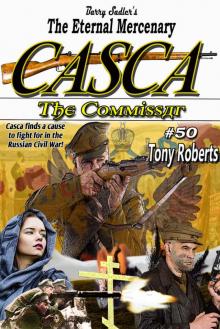 The Commissar
The Commissar Casca 45: Emperor's Mercenary
Casca 45: Emperor's Mercenary Dark Blade
Dark Blade The Heir of Gorradan (Chronicles of Faerowyn Book 2)
The Heir of Gorradan (Chronicles of Faerowyn Book 2) Casca 31: The Conqueror
Casca 31: The Conqueror Casca 32: The Anzac
Casca 32: The Anzac The Anzac
The Anzac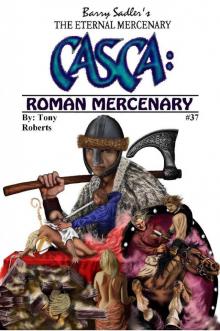 Casca 37: Roman Mercenary
Casca 37: Roman Mercenary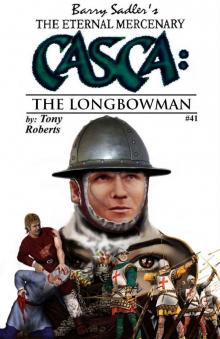 Casca 41: The Longbowman
Casca 41: The Longbowman The Longbowman
The Longbowman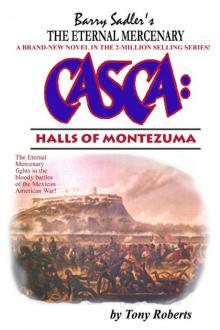 Casca 25: Halls of Montezuma
Casca 25: Halls of Montezuma Sword of the Brotherhood
Sword of the Brotherhood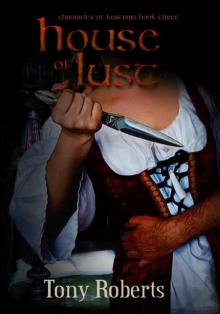 House of Lust
House of Lust Casca 39 The Crusader
Casca 39 The Crusader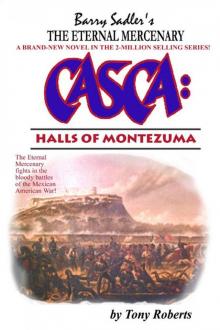 Halls of Montezuma
Halls of Montezuma Devil's Horseman
Devil's Horseman Casca 40: Blitzkrieg
Casca 40: Blitzkrieg Casca 38: The Continental
Casca 38: The Continental The Minuteman
The Minuteman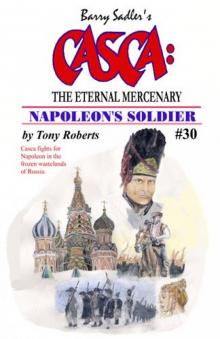 Napoleon's Soldier
Napoleon's Soldier Casca 35: Sword of the Brotherhood
Casca 35: Sword of the Brotherhood Casca 30: Napoleon's Soldier
Casca 30: Napoleon's Soldier The Continental
The Continental The Confederate
The Confederate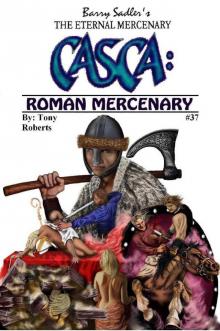 Roman Mercenary
Roman Mercenary Casca 27: The Confederate
Casca 27: The Confederate Casca 36: The Minuteman
Casca 36: The Minuteman Casca 28: The Avenger
Casca 28: The Avenger The Avenger
The Avenger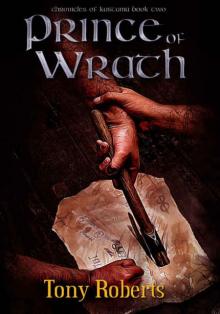 Prince of Wrath
Prince of Wrath